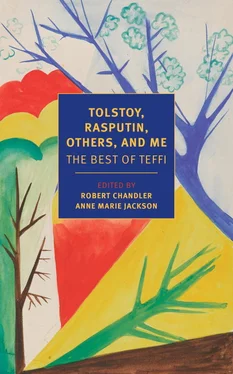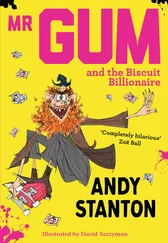“Although that, I think we can say, has nothing to do with it,” said the first brother. “Helen of Troy didn’t have French governesses, and she ate fish with her fingers—not even with a knife—yet her renown as a world beauty remains unchallenged. What’s the matter, Kishmish? Why have you gone so red?”
“Kishmish” was my nickname. [3] In her autobiographical sketch “Kishmish”, Teffi explains that a kishmish is a kind of small raisin from the Caucasus and that she was given this nickname because, until she suddenly grew quite tall towards the age of thirteen, she was exceptionally short. Her shortness—and this nickname—greatly upset her.
I answered in a trembling voice, “Leave me in peace. I’m not doing you any harm. But you… you’re always picking on me.”
In the evening, lying on the sofa in the dark drawing room, I heard my mother in the hall; she was playing a piece I loved, the cavatina from the opera Martha . [4] Martha, or Richmond Fair (1847) by the German composer Friedrich von Flotow (1812–83).
Something in the soft, tender melody evoked—called up within me—the same singing languor that I had seen in Ganka’s movements. And this sweet torment, and the music, and my sadness and happiness made me cry, burying my face in a cushion.
•
It was a grey morning, and I was afraid it would rain and I wouldn’t be allowed out into the garden.
I was, indeed, not allowed out.
I sat down sadly at the piano and began playing exercises, stumbling each time in the same place.
But later in the morning the sun appeared and I raced out into the garden.
The girls had just thrown down their spades and sat down for their midday meal. They got out pots and jugs wrapped in cloths and began to eat. One was eating buckwheat kasha, another had some soured milk. Ganka unwrapped her own little bundle, took out a thick crust of bread and a bulb of garlic, rubbed the bread with the garlic and began to eat, shining her mischievous eyes at me.
I took fright and went away. How terrible that Ganka ate such filth. It was as if the garlic had thrust her away from me. She had become alien and incomprehensible. Better if she’d eaten fish with a knife.
I remembered what my brother had said about Yelena the Beautiful, [5] The heroine of many Russian folk tales, here confused with Helen of Troy.
but this brought me no consolation and I plodded back to the house.
Nanny was sitting by the back door, knitting a stocking and listening to the housekeeper.
I heard the name “Ganka” and froze. I knew only too well that if I went up to them they’d either shoo me away or stop talking.
“She worked for the steward’s wife all winter. She’s a hardworking girl. But not an evening went by—the steward’s wife noticed—without a soldier coming to see her. The steward’s wife packed him off once, and she packed him off twice—but what could the good woman do? She couldn’t be packing him off night after night.”
“Indeed!” said Nanny. “How could she?”
“So she scolded her now and again, of course, but Ganka just laughed—it was water off a duck’s back. Then, just before Twelfth Night, the steward’s wife hears noises in the kitchen—as if Ganka were constantly pushing something about the room. And then, first thing in the morning, she hears tiny squeals. She hurries into the kitchen: not a sign of Ganka—just a baby wrapped up in pieces of cloth, lying on some bedding and letting out little squeals. She takes fright. She looks everywhere: where was Ganka? Had something very bad happened? She looks out through the window—and there she is. Standing by the hole in the ice, barefoot, washing out her linen and singing away. The steward’s wife would have liked to dismiss her, but how could she manage without her? It’s not easy to find such a sturdy, hard-working lass.”
I slipped quietly off.
So Ganka was friends with a common, uneducated soldier. This was horrible, horrible. And then she had tormented some little baby. This really was something dark and terrible. She had stolen it from somewhere and wrapped it up in rags; and when it had begun to squeal, she’d run off to the ice hole and sung songs there.
All evening I was in misery. That night I had a dream from which I awoke in tears. But my dream was neither sad nor frightening, and I was crying not from grief but from rapture. When I woke, I could barely remember it. I could only say, “I dreamt of a boat. It was quite transparent, light blue. It floated through the wall, straight into silver rushes. Everything was poetry and music.”
“So why all the howling?” asked Nanny. “It’s only a boat! Maybe this boat of yours will bring you something good.”
I could see she didn’t understand, but there was nothing more I could say or explain. And my soul was ringing, singing, weeping in ecstasy. A light-blue boat, silver rushes, poetry and music.
I didn’t go out into the garden. I was afraid I’d see Ganka and begin thinking about the soldier and the little baby wrapped up in cloth, that everything would once again become frightening and incomprehensible.
The day dragged restlessly on. It was blustery outside and the wind was bending the trees. The branches shook; the leaves made a dry, boiling sound, like sea surf.
In the corridor, outside the store room, was a surprise: on the table stood an opened crate of oranges. It must have been brought from town that morning; after lunch they’d be handed out to us.
I adore oranges. They are round and golden, like the sun, and beneath their peel are thousands of tiny pockets bursting with sweet, fragrant juice. An orange is a joy. An orange is a thing of beauty.
And suddenly I thought of Ganka. She didn’t know about oranges. Warm tenderness and pity filled my heart.
Poor Ganka! She didn’t know. I must give her one. But how? To take one without asking was unthinkable. But if I did ask, I’d be told to wait until after lunch. And then I wouldn’t be able to take the orange away from table. I wouldn’t be allowed to, or they’d ask questions—someone might even guess. I’d be laughed at. Better just to take one without asking. I’d be punished, I wouldn’t be given any more—but so what? What was I afraid of ?
Round, cool and pleasing, the orange lay in my hand.
How could I? Thief! Thief! Never mind. There’d be time enough for all that—what mattered now was to find Ganka.
The girls turned out to be weeding right by the house, by the back door.
“Ganka! This is for you, for you! Try it—it’s for you.”
Her red mouth laughed.
“What is it?”
“It’s an orange. It’s for you.”
She turned it round and round in her hand. I mustn’t embarrass her.
I ran back inside and, sticking my head out of the corridor window, waited to see what would happen. I wanted to share in Ganka’s delight.
She bit off a piece together with the peel (Oh, why hadn’t I peeled it first?), then suddenly opened her mouth wide, made a horrible face, spat everything out and hurled the orange far into the bushes. The other girls stood around her, laughing. And she was still screwing up her face, shaking her head, spitting, and wiping her mouth with the cuff of her embroidered shirt.
I climbed down from the windowsill and went quickly to the dark end of the corridor. Squeezing behind a large chest covered with a dusty carpet, I sat on the floor and began to weep.
Everything was over. I had become a thief in order to give her the best thing I knew in all the world. And she hadn’t understood, and she had spat it out.
How would I ever survive this grief and this hurt?
I wept till I had no more tears. Then a new thought came into my head: “What if there are mice here behind the chest?”
Читать дальше












